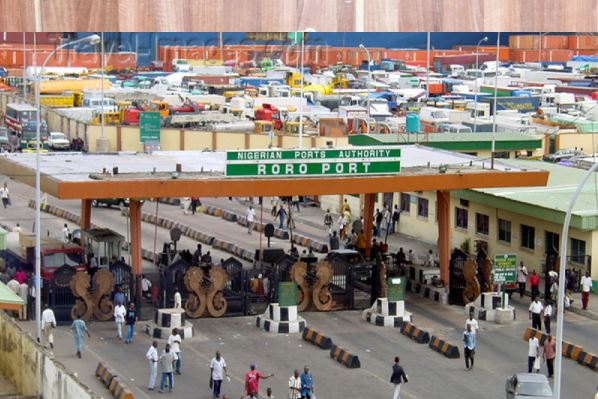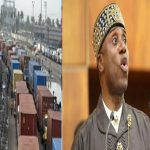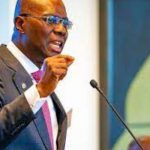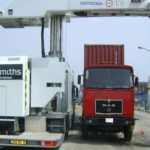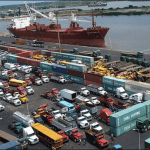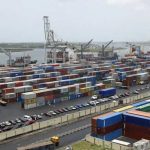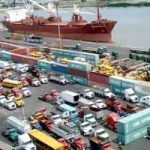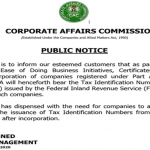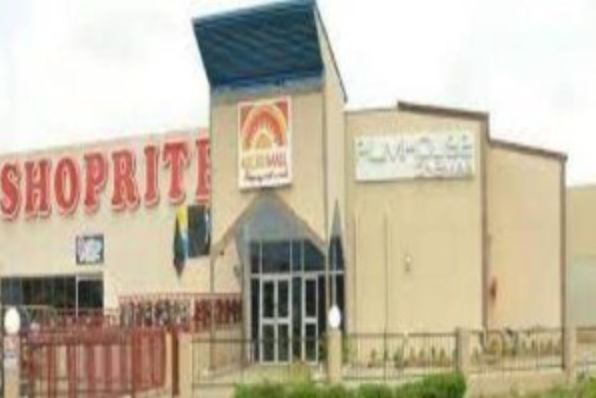The Nigerian Ports Authority’s Acting Managing Director, Mohammed Bello-Koko, has issued a warning that the Tin-Can Island Port, Onne Port, Delta Port, and Calabar Ports are currently collapsing and require huge funds to be repaired.
Mr. Bello-Koko stated this during the first retreat for the Authority’s reconstituted Board of Directors, which had the theme “Expanding the Frontiers of Service Excellence,” according to a statement released on Sunday by the NPA General Manager, Corporate and Strategic Communications, Olaseni Alakija.
According to the statement, “Nigeria accounts for around 70% of cargoes imported into West and Central Africa, and the country commands an amazing stretch of the Atlantic Ocean.” Nigeria’s vast aquatic assets, as well as its border with landlocked states, make deep seaport development a big prospective money earner for the country.
“The move towards earning the status of the hub in the region is in line with our new vision statement which was adopted at the recent NPA Management retreat, “To Be The Maritime Logistics Hub For Sustainable Port System In Africa.”
He described the board retreat as “very timely,” stating that it “signposts a unity of purpose and shared vision,” in which executive management collaborates closely with every section, unit, department, division, and directorate to embrace an all-encompassing strategic outcome for the Authority with the Board’s buy-in.”
“In recognition of this, I would like to request the Board’s acceptance of executive management’s constraints in achieving some of our aims and objectives, which I am sure outstanding board members must have seen during the port tour that preceded this retreat.” Mohammed Bello-Koko went on to say.
The acting NPA Boss briefed the Board that the Authority’s recent actions had resulted in considerable reductions in ship and cargo stay time at the port. “Some of the benchmarks we have yet to achieve are dependent on externalities and variables that require concerted inter-agency actions, which the Authority, despite tenacious efforts, has yet to optimally achieve owing to systemic administrative constraints and red tape, including conflicting directives from agencies operating within the port value chain and reporting,” he explained.
He further reminded the Board that, in addition to money from traditional port operations, concerted efforts are being made to extend the Authority’s revenue streams. “Unlike our sister francophone countries, where the government pays port dredging, we are responsible for funding our own, putting a burden on our resources and capacity to invest in key port infrastructure,” he says.
We are facing decaying port infrastructure, for example, sections of the quay aprons or walls at Tin Can Island Port, Onne, Delta, and Calabar ports are collapsing and require huge funds to repair them. With the increasing pressure to remit more revenue to the Consolidated Revenue Fund (CRF) of the Federation, it has become very difficult to have sufficient funds to attend to these decaying facilities, hence the need to explore alternative funding sources outside the traditional port service offerings” he stated.
The NPA acting Managing Director disclosed that the Authority’s Management has begun to explore smart ways to boost the revenue performance of the organization.
He added that the Authority had prime real estate that might be used as a source of funding outside of the usual budget. “NPA has a lot of high-value landed properties in Onne, Snake Island, and Takwa Bay that are designated free trade zones and are mostly allocated, but they have a poor arterial road network and other infrastructure to make them attractive for private investment, which would bring good revenue to the Authority and the Federal Government.
Management will need the support of the Board to drive the process of alternative revenue sources to actualize the lofty aspirations of the Authority, he posited.
He also stated that management has begun discussions with multilateral financial institutions such as the French Development Agency (AFD), the African Development Bank (AfDB), the European Investment Bank (EIB), and Sanlam Infraworks (a Central Bank of Nigeria approved fund manager for InfraCorp), all as part of plans to obtain long-term low-interest credit for port infrastructure upgrades and expansion.
Bello-Koko also touched on efforts by the Management to make Nigerian seaports more business-friendly. In his words, “we have been able to deploy technology to address the perennial traffic gridlock that has been frustrating the conduct of business around the Lagos ports corridor. A software application code-named “eto” is gradually restoring sanity to trucking business despite the initial teething problems and resistance by vested interests hitherto profiting from the chaos.
The Authority has accredited 33 private truck terminals within the Lagos area, in addition to the Lilypond Truck Transit Park and Tin Can Island Port Truck Transit Park, to ensure trucks do not park indiscriminately on the access roads and would only be allowed to transit to the port after obtaining electronic tickets via the “eto” call-up platform.
The Authority is collaborating with the Lagos State Government to ensure enforcement and compliance with the e-call up system, he said.
Another solution being implemented is the push to link all seaports to the national rail network as well optimize the use of the inland waterways through the transfer of cargo or containers via barges.
Mr. Emmanuel Adesoye FCA, Chairman of the Board, had earlier described the retreat as an opportunity for the Board and Management to “not only rethink our strategies, structures, and systems for effective service delivery, but also to unwind, reconnect, and strengthen our bonds as team players committed to upholding excellence,” as he stated in his welcome address.
Earlier in his welcome address, Chairman of the Board, Mr. Emmanuel Adesoye FCA, described the retreat as an opportunity for the Board and Management “not just to rethink our strategies, structures, and systems for effective service delivery, but also to unwind, reconnect and strengthen our bonds as team players committed to upholding excellence”, he remarked.
The Nigerian Ports Authority’s Acting Managing Director, Mohammed Bello-Koko, has issued a warning that the Tin-Can Island Port, Onne Port, Delta Port, and Calabar Ports are currently collapsing and require huge funds to be repaired.
Mr. Bello-Koko stated this during the first retreat for the Authority’s reconstituted Board of Directors, which had the theme “Expanding the Frontiers of Service Excellence,” according to a statement released on Sunday by the NPA General Manager, Corporate and Strategic Communications, Olaseni Alakija.
According to the statement, “Nigeria accounts for around 70% of cargoes imported into West and Central Africa, and the country commands an amazing stretch of the Atlantic Ocean.” Nigeria’s vast aquatic assets, as well as its border with landlocked states, make deep seaport development a big prospective money earner for the country.
“The move towards earning the status of the hub in the region is in line with our new vision statement which was adopted at the recent NPA Management retreat, “To Be The Maritime Logistics Hub For Sustainable Port System In Africa.”
He described the board retreat as “very timely,” stating that it “signposts a unity of purpose and shared vision,” in which executive management collaborates closely with every section, unit, department, division, and directorate to embrace an all-encompassing strategic outcome for the Authority with the Board’s buy-in.”
“In recognition of this, I would like to request the Board’s acceptance of executive management’s constraints in achieving some of our aims and objectives, which I am sure outstanding board members must have seen during the port tour that preceded this retreat.” Mohammed Bello-Koko went on to say.
The acting NPA Boss briefed the Board that the Authority’s recent actions had resulted in considerable reductions in ship and cargo stay time at the port. “Some of the benchmarks we have yet to achieve are dependent on externalities and variables that require concerted inter-agency actions, which the Authority, despite tenacious efforts, has yet to optimally achieve owing to systemic administrative constraints and red tape, including conflicting directives from agencies operating within the port value chain and reporting,” he explained.
He further reminded the Board that, in addition to money from traditional port operations, concerted efforts are being made to extend the Authority’s revenue streams. “Unlike our sister francophone countries, where the government pays port dredging, we are responsible for funding our own, putting a burden on our resources and capacity to invest in key port infrastructure,” he says.
We are facing decaying port infrastructure, for example, sections of the quay aprons or walls at Tin Can Island Port, Onne, Delta, and Calabar ports are collapsing and require huge funds to repair them. With the increasing pressure to remit more revenue to the Consolidated Revenue Fund (CRF) of the Federation, it has become very difficult to have sufficient funds to attend to these decaying facilities, hence the need to explore alternative funding sources outside the traditional port service offerings” he stated.
The NPA acting Managing Director disclosed that the Authority’s Management has begun to explore smart ways to boost the revenue performance of the organization.
He added that the Authority had prime real estate that might be used as a source of funding outside of the usual budget. “NPA has a lot of high-value landed properties in Onne, Snake Island, and Takwa Bay that are designated free trade zones and are mostly allocated, but they have a poor arterial road network and other infrastructure to make them attractive for private investment, which would bring good revenue to the Authority and the Federal Government.
Management will need the support of the Board to drive the process of alternative revenue sources to actualize the lofty aspirations of the Authority, he posited.
He also stated that management has begun discussions with multilateral financial institutions such as the French Development Agency (AFD), the African Development Bank (AfDB), the European Investment Bank (EIB), and Sanlam Infraworks (a Central Bank of Nigeria approved fund manager for InfraCorp), all as part of plans to obtain long-term low-interest credit for port infrastructure upgrades and expansion.
Bello-Koko also touched on efforts by the Management to make Nigerian seaports more business-friendly. In his words, “we have been able to deploy technology to address the perennial traffic gridlock that has been frustrating the conduct of business around the Lagos ports corridor. A software application code-named “eto” is gradually restoring sanity to trucking business despite the initial teething problems and resistance by vested interests hitherto profiting from the chaos.
The Authority has accredited 33 private truck terminals within the Lagos area, in addition to the Lilypond Truck Transit Park and Tin Can Island Port Truck Transit Park, to ensure trucks do not park indiscriminately on the access roads and would only be allowed to transit to the port after obtaining electronic tickets via the “eto” call-up platform.
The Authority is collaborating with the Lagos State Government to ensure enforcement and compliance with the e-call up system, he said.
Another solution being implemented is the push to link all seaports to the national rail network as well optimize the use of the inland waterways through the transfer of cargo or containers via barges.
Mr. Emmanuel Adesoye FCA, Chairman of the Board, had earlier described the retreat as an opportunity for the Board and Management to “not only rethink our strategies, structures, and systems for effective service delivery, but also to unwind, reconnect, and strengthen our bonds as team players committed to upholding excellence,” as he stated in his welcome address.
Earlier in his welcome address, Chairman of the Board, Mr. Emmanuel Adesoye FCA, described the retreat as an opportunity for the Board and Management “not just to rethink our strategies, structures, and systems for effective service delivery, but also to unwind, reconnect and strengthen our bonds as team players committed to upholding excellence”, he remarked.
The Nigerian Ports Authority’s Acting Managing Director, Mohammed Bello-Koko, has issued a warning that the Tin-Can Island Port, Onne Port, Delta Port, and Calabar Ports are currently collapsing and require huge funds to be repaired.
Mr. Bello-Koko stated this during the first retreat for the Authority’s reconstituted Board of Directors, which had the theme “Expanding the Frontiers of Service Excellence,” according to a statement released on Sunday by the NPA General Manager, Corporate and Strategic Communications, Olaseni Alakija.
According to the statement, “Nigeria accounts for around 70% of cargoes imported into West and Central Africa, and the country commands an amazing stretch of the Atlantic Ocean.” Nigeria’s vast aquatic assets, as well as its border with landlocked states, make deep seaport development a big prospective money earner for the country.
“The move towards earning the status of the hub in the region is in line with our new vision statement which was adopted at the recent NPA Management retreat, “To Be The Maritime Logistics Hub For Sustainable Port System In Africa.”
He described the board retreat as “very timely,” stating that it “signposts a unity of purpose and shared vision,” in which executive management collaborates closely with every section, unit, department, division, and directorate to embrace an all-encompassing strategic outcome for the Authority with the Board’s buy-in.”
“In recognition of this, I would like to request the Board’s acceptance of executive management’s constraints in achieving some of our aims and objectives, which I am sure outstanding board members must have seen during the port tour that preceded this retreat.” Mohammed Bello-Koko went on to say.
The acting NPA Boss briefed the Board that the Authority’s recent actions had resulted in considerable reductions in ship and cargo stay time at the port. “Some of the benchmarks we have yet to achieve are dependent on externalities and variables that require concerted inter-agency actions, which the Authority, despite tenacious efforts, has yet to optimally achieve owing to systemic administrative constraints and red tape, including conflicting directives from agencies operating within the port value chain and reporting,” he explained.
He further reminded the Board that, in addition to money from traditional port operations, concerted efforts are being made to extend the Authority’s revenue streams. “Unlike our sister francophone countries, where the government pays port dredging, we are responsible for funding our own, putting a burden on our resources and capacity to invest in key port infrastructure,” he says.
We are facing decaying port infrastructure, for example, sections of the quay aprons or walls at Tin Can Island Port, Onne, Delta, and Calabar ports are collapsing and require huge funds to repair them. With the increasing pressure to remit more revenue to the Consolidated Revenue Fund (CRF) of the Federation, it has become very difficult to have sufficient funds to attend to these decaying facilities, hence the need to explore alternative funding sources outside the traditional port service offerings” he stated.
The NPA acting Managing Director disclosed that the Authority’s Management has begun to explore smart ways to boost the revenue performance of the organization.
He added that the Authority had prime real estate that might be used as a source of funding outside of the usual budget. “NPA has a lot of high-value landed properties in Onne, Snake Island, and Takwa Bay that are designated free trade zones and are mostly allocated, but they have a poor arterial road network and other infrastructure to make them attractive for private investment, which would bring good revenue to the Authority and the Federal Government.
Management will need the support of the Board to drive the process of alternative revenue sources to actualize the lofty aspirations of the Authority, he posited.
He also stated that management has begun discussions with multilateral financial institutions such as the French Development Agency (AFD), the African Development Bank (AfDB), the European Investment Bank (EIB), and Sanlam Infraworks (a Central Bank of Nigeria approved fund manager for InfraCorp), all as part of plans to obtain long-term low-interest credit for port infrastructure upgrades and expansion.
Bello-Koko also touched on efforts by the Management to make Nigerian seaports more business-friendly. In his words, “we have been able to deploy technology to address the perennial traffic gridlock that has been frustrating the conduct of business around the Lagos ports corridor. A software application code-named “eto” is gradually restoring sanity to trucking business despite the initial teething problems and resistance by vested interests hitherto profiting from the chaos.
The Authority has accredited 33 private truck terminals within the Lagos area, in addition to the Lilypond Truck Transit Park and Tin Can Island Port Truck Transit Park, to ensure trucks do not park indiscriminately on the access roads and would only be allowed to transit to the port after obtaining electronic tickets via the “eto” call-up platform.
The Authority is collaborating with the Lagos State Government to ensure enforcement and compliance with the e-call up system, he said.
Another solution being implemented is the push to link all seaports to the national rail network as well optimize the use of the inland waterways through the transfer of cargo or containers via barges.
Mr. Emmanuel Adesoye FCA, Chairman of the Board, had earlier described the retreat as an opportunity for the Board and Management to “not only rethink our strategies, structures, and systems for effective service delivery, but also to unwind, reconnect, and strengthen our bonds as team players committed to upholding excellence,” as he stated in his welcome address.
Earlier in his welcome address, Chairman of the Board, Mr. Emmanuel Adesoye FCA, described the retreat as an opportunity for the Board and Management “not just to rethink our strategies, structures, and systems for effective service delivery, but also to unwind, reconnect and strengthen our bonds as team players committed to upholding excellence”, he remarked.
The Nigerian Ports Authority’s Acting Managing Director, Mohammed Bello-Koko, has issued a warning that the Tin-Can Island Port, Onne Port, Delta Port, and Calabar Ports are currently collapsing and require huge funds to be repaired.
Mr. Bello-Koko stated this during the first retreat for the Authority’s reconstituted Board of Directors, which had the theme “Expanding the Frontiers of Service Excellence,” according to a statement released on Sunday by the NPA General Manager, Corporate and Strategic Communications, Olaseni Alakija.
According to the statement, “Nigeria accounts for around 70% of cargoes imported into West and Central Africa, and the country commands an amazing stretch of the Atlantic Ocean.” Nigeria’s vast aquatic assets, as well as its border with landlocked states, make deep seaport development a big prospective money earner for the country.
“The move towards earning the status of the hub in the region is in line with our new vision statement which was adopted at the recent NPA Management retreat, “To Be The Maritime Logistics Hub For Sustainable Port System In Africa.”
He described the board retreat as “very timely,” stating that it “signposts a unity of purpose and shared vision,” in which executive management collaborates closely with every section, unit, department, division, and directorate to embrace an all-encompassing strategic outcome for the Authority with the Board’s buy-in.”
“In recognition of this, I would like to request the Board’s acceptance of executive management’s constraints in achieving some of our aims and objectives, which I am sure outstanding board members must have seen during the port tour that preceded this retreat.” Mohammed Bello-Koko went on to say.
The acting NPA Boss briefed the Board that the Authority’s recent actions had resulted in considerable reductions in ship and cargo stay time at the port. “Some of the benchmarks we have yet to achieve are dependent on externalities and variables that require concerted inter-agency actions, which the Authority, despite tenacious efforts, has yet to optimally achieve owing to systemic administrative constraints and red tape, including conflicting directives from agencies operating within the port value chain and reporting,” he explained.
He further reminded the Board that, in addition to money from traditional port operations, concerted efforts are being made to extend the Authority’s revenue streams. “Unlike our sister francophone countries, where the government pays port dredging, we are responsible for funding our own, putting a burden on our resources and capacity to invest in key port infrastructure,” he says.
We are facing decaying port infrastructure, for example, sections of the quay aprons or walls at Tin Can Island Port, Onne, Delta, and Calabar ports are collapsing and require huge funds to repair them. With the increasing pressure to remit more revenue to the Consolidated Revenue Fund (CRF) of the Federation, it has become very difficult to have sufficient funds to attend to these decaying facilities, hence the need to explore alternative funding sources outside the traditional port service offerings” he stated.
The NPA acting Managing Director disclosed that the Authority’s Management has begun to explore smart ways to boost the revenue performance of the organization.
He added that the Authority had prime real estate that might be used as a source of funding outside of the usual budget. “NPA has a lot of high-value landed properties in Onne, Snake Island, and Takwa Bay that are designated free trade zones and are mostly allocated, but they have a poor arterial road network and other infrastructure to make them attractive for private investment, which would bring good revenue to the Authority and the Federal Government.
Management will need the support of the Board to drive the process of alternative revenue sources to actualize the lofty aspirations of the Authority, he posited.
He also stated that management has begun discussions with multilateral financial institutions such as the French Development Agency (AFD), the African Development Bank (AfDB), the European Investment Bank (EIB), and Sanlam Infraworks (a Central Bank of Nigeria approved fund manager for InfraCorp), all as part of plans to obtain long-term low-interest credit for port infrastructure upgrades and expansion.
Bello-Koko also touched on efforts by the Management to make Nigerian seaports more business-friendly. In his words, “we have been able to deploy technology to address the perennial traffic gridlock that has been frustrating the conduct of business around the Lagos ports corridor. A software application code-named “eto” is gradually restoring sanity to trucking business despite the initial teething problems and resistance by vested interests hitherto profiting from the chaos.
The Authority has accredited 33 private truck terminals within the Lagos area, in addition to the Lilypond Truck Transit Park and Tin Can Island Port Truck Transit Park, to ensure trucks do not park indiscriminately on the access roads and would only be allowed to transit to the port after obtaining electronic tickets via the “eto” call-up platform.
The Authority is collaborating with the Lagos State Government to ensure enforcement and compliance with the e-call up system, he said.
Another solution being implemented is the push to link all seaports to the national rail network as well optimize the use of the inland waterways through the transfer of cargo or containers via barges.
Mr. Emmanuel Adesoye FCA, Chairman of the Board, had earlier described the retreat as an opportunity for the Board and Management to “not only rethink our strategies, structures, and systems for effective service delivery, but also to unwind, reconnect, and strengthen our bonds as team players committed to upholding excellence,” as he stated in his welcome address.
Earlier in his welcome address, Chairman of the Board, Mr. Emmanuel Adesoye FCA, described the retreat as an opportunity for the Board and Management “not just to rethink our strategies, structures, and systems for effective service delivery, but also to unwind, reconnect and strengthen our bonds as team players committed to upholding excellence”, he remarked.
The Nigerian Ports Authority’s Acting Managing Director, Mohammed Bello-Koko, has issued a warning that the Tin-Can Island Port, Onne Port, Delta Port, and Calabar Ports are currently collapsing and require huge funds to be repaired.
Mr. Bello-Koko stated this during the first retreat for the Authority’s reconstituted Board of Directors, which had the theme “Expanding the Frontiers of Service Excellence,” according to a statement released on Sunday by the NPA General Manager, Corporate and Strategic Communications, Olaseni Alakija.
According to the statement, “Nigeria accounts for around 70% of cargoes imported into West and Central Africa, and the country commands an amazing stretch of the Atlantic Ocean.” Nigeria’s vast aquatic assets, as well as its border with landlocked states, make deep seaport development a big prospective money earner for the country.
“The move towards earning the status of the hub in the region is in line with our new vision statement which was adopted at the recent NPA Management retreat, “To Be The Maritime Logistics Hub For Sustainable Port System In Africa.”
He described the board retreat as “very timely,” stating that it “signposts a unity of purpose and shared vision,” in which executive management collaborates closely with every section, unit, department, division, and directorate to embrace an all-encompassing strategic outcome for the Authority with the Board’s buy-in.”
“In recognition of this, I would like to request the Board’s acceptance of executive management’s constraints in achieving some of our aims and objectives, which I am sure outstanding board members must have seen during the port tour that preceded this retreat.” Mohammed Bello-Koko went on to say.
The acting NPA Boss briefed the Board that the Authority’s recent actions had resulted in considerable reductions in ship and cargo stay time at the port. “Some of the benchmarks we have yet to achieve are dependent on externalities and variables that require concerted inter-agency actions, which the Authority, despite tenacious efforts, has yet to optimally achieve owing to systemic administrative constraints and red tape, including conflicting directives from agencies operating within the port value chain and reporting,” he explained.
He further reminded the Board that, in addition to money from traditional port operations, concerted efforts are being made to extend the Authority’s revenue streams. “Unlike our sister francophone countries, where the government pays port dredging, we are responsible for funding our own, putting a burden on our resources and capacity to invest in key port infrastructure,” he says.
We are facing decaying port infrastructure, for example, sections of the quay aprons or walls at Tin Can Island Port, Onne, Delta, and Calabar ports are collapsing and require huge funds to repair them. With the increasing pressure to remit more revenue to the Consolidated Revenue Fund (CRF) of the Federation, it has become very difficult to have sufficient funds to attend to these decaying facilities, hence the need to explore alternative funding sources outside the traditional port service offerings” he stated.
The NPA acting Managing Director disclosed that the Authority’s Management has begun to explore smart ways to boost the revenue performance of the organization.
He added that the Authority had prime real estate that might be used as a source of funding outside of the usual budget. “NPA has a lot of high-value landed properties in Onne, Snake Island, and Takwa Bay that are designated free trade zones and are mostly allocated, but they have a poor arterial road network and other infrastructure to make them attractive for private investment, which would bring good revenue to the Authority and the Federal Government.
Management will need the support of the Board to drive the process of alternative revenue sources to actualize the lofty aspirations of the Authority, he posited.
He also stated that management has begun discussions with multilateral financial institutions such as the French Development Agency (AFD), the African Development Bank (AfDB), the European Investment Bank (EIB), and Sanlam Infraworks (a Central Bank of Nigeria approved fund manager for InfraCorp), all as part of plans to obtain long-term low-interest credit for port infrastructure upgrades and expansion.
Bello-Koko also touched on efforts by the Management to make Nigerian seaports more business-friendly. In his words, “we have been able to deploy technology to address the perennial traffic gridlock that has been frustrating the conduct of business around the Lagos ports corridor. A software application code-named “eto” is gradually restoring sanity to trucking business despite the initial teething problems and resistance by vested interests hitherto profiting from the chaos.
The Authority has accredited 33 private truck terminals within the Lagos area, in addition to the Lilypond Truck Transit Park and Tin Can Island Port Truck Transit Park, to ensure trucks do not park indiscriminately on the access roads and would only be allowed to transit to the port after obtaining electronic tickets via the “eto” call-up platform.
The Authority is collaborating with the Lagos State Government to ensure enforcement and compliance with the e-call up system, he said.
Another solution being implemented is the push to link all seaports to the national rail network as well optimize the use of the inland waterways through the transfer of cargo or containers via barges.
Mr. Emmanuel Adesoye FCA, Chairman of the Board, had earlier described the retreat as an opportunity for the Board and Management to “not only rethink our strategies, structures, and systems for effective service delivery, but also to unwind, reconnect, and strengthen our bonds as team players committed to upholding excellence,” as he stated in his welcome address.
Earlier in his welcome address, Chairman of the Board, Mr. Emmanuel Adesoye FCA, described the retreat as an opportunity for the Board and Management “not just to rethink our strategies, structures, and systems for effective service delivery, but also to unwind, reconnect and strengthen our bonds as team players committed to upholding excellence”, he remarked.
The Nigerian Ports Authority’s Acting Managing Director, Mohammed Bello-Koko, has issued a warning that the Tin-Can Island Port, Onne Port, Delta Port, and Calabar Ports are currently collapsing and require huge funds to be repaired.
Mr. Bello-Koko stated this during the first retreat for the Authority’s reconstituted Board of Directors, which had the theme “Expanding the Frontiers of Service Excellence,” according to a statement released on Sunday by the NPA General Manager, Corporate and Strategic Communications, Olaseni Alakija.
According to the statement, “Nigeria accounts for around 70% of cargoes imported into West and Central Africa, and the country commands an amazing stretch of the Atlantic Ocean.” Nigeria’s vast aquatic assets, as well as its border with landlocked states, make deep seaport development a big prospective money earner for the country.
“The move towards earning the status of the hub in the region is in line with our new vision statement which was adopted at the recent NPA Management retreat, “To Be The Maritime Logistics Hub For Sustainable Port System In Africa.”
He described the board retreat as “very timely,” stating that it “signposts a unity of purpose and shared vision,” in which executive management collaborates closely with every section, unit, department, division, and directorate to embrace an all-encompassing strategic outcome for the Authority with the Board’s buy-in.”
“In recognition of this, I would like to request the Board’s acceptance of executive management’s constraints in achieving some of our aims and objectives, which I am sure outstanding board members must have seen during the port tour that preceded this retreat.” Mohammed Bello-Koko went on to say.
The acting NPA Boss briefed the Board that the Authority’s recent actions had resulted in considerable reductions in ship and cargo stay time at the port. “Some of the benchmarks we have yet to achieve are dependent on externalities and variables that require concerted inter-agency actions, which the Authority, despite tenacious efforts, has yet to optimally achieve owing to systemic administrative constraints and red tape, including conflicting directives from agencies operating within the port value chain and reporting,” he explained.
He further reminded the Board that, in addition to money from traditional port operations, concerted efforts are being made to extend the Authority’s revenue streams. “Unlike our sister francophone countries, where the government pays port dredging, we are responsible for funding our own, putting a burden on our resources and capacity to invest in key port infrastructure,” he says.
We are facing decaying port infrastructure, for example, sections of the quay aprons or walls at Tin Can Island Port, Onne, Delta, and Calabar ports are collapsing and require huge funds to repair them. With the increasing pressure to remit more revenue to the Consolidated Revenue Fund (CRF) of the Federation, it has become very difficult to have sufficient funds to attend to these decaying facilities, hence the need to explore alternative funding sources outside the traditional port service offerings” he stated.
The NPA acting Managing Director disclosed that the Authority’s Management has begun to explore smart ways to boost the revenue performance of the organization.
He added that the Authority had prime real estate that might be used as a source of funding outside of the usual budget. “NPA has a lot of high-value landed properties in Onne, Snake Island, and Takwa Bay that are designated free trade zones and are mostly allocated, but they have a poor arterial road network and other infrastructure to make them attractive for private investment, which would bring good revenue to the Authority and the Federal Government.
Management will need the support of the Board to drive the process of alternative revenue sources to actualize the lofty aspirations of the Authority, he posited.
He also stated that management has begun discussions with multilateral financial institutions such as the French Development Agency (AFD), the African Development Bank (AfDB), the European Investment Bank (EIB), and Sanlam Infraworks (a Central Bank of Nigeria approved fund manager for InfraCorp), all as part of plans to obtain long-term low-interest credit for port infrastructure upgrades and expansion.
Bello-Koko also touched on efforts by the Management to make Nigerian seaports more business-friendly. In his words, “we have been able to deploy technology to address the perennial traffic gridlock that has been frustrating the conduct of business around the Lagos ports corridor. A software application code-named “eto” is gradually restoring sanity to trucking business despite the initial teething problems and resistance by vested interests hitherto profiting from the chaos.
The Authority has accredited 33 private truck terminals within the Lagos area, in addition to the Lilypond Truck Transit Park and Tin Can Island Port Truck Transit Park, to ensure trucks do not park indiscriminately on the access roads and would only be allowed to transit to the port after obtaining electronic tickets via the “eto” call-up platform.
The Authority is collaborating with the Lagos State Government to ensure enforcement and compliance with the e-call up system, he said.
Another solution being implemented is the push to link all seaports to the national rail network as well optimize the use of the inland waterways through the transfer of cargo or containers via barges.
Mr. Emmanuel Adesoye FCA, Chairman of the Board, had earlier described the retreat as an opportunity for the Board and Management to “not only rethink our strategies, structures, and systems for effective service delivery, but also to unwind, reconnect, and strengthen our bonds as team players committed to upholding excellence,” as he stated in his welcome address.
Earlier in his welcome address, Chairman of the Board, Mr. Emmanuel Adesoye FCA, described the retreat as an opportunity for the Board and Management “not just to rethink our strategies, structures, and systems for effective service delivery, but also to unwind, reconnect and strengthen our bonds as team players committed to upholding excellence”, he remarked.
The Nigerian Ports Authority’s Acting Managing Director, Mohammed Bello-Koko, has issued a warning that the Tin-Can Island Port, Onne Port, Delta Port, and Calabar Ports are currently collapsing and require huge funds to be repaired.
Mr. Bello-Koko stated this during the first retreat for the Authority’s reconstituted Board of Directors, which had the theme “Expanding the Frontiers of Service Excellence,” according to a statement released on Sunday by the NPA General Manager, Corporate and Strategic Communications, Olaseni Alakija.
According to the statement, “Nigeria accounts for around 70% of cargoes imported into West and Central Africa, and the country commands an amazing stretch of the Atlantic Ocean.” Nigeria’s vast aquatic assets, as well as its border with landlocked states, make deep seaport development a big prospective money earner for the country.
“The move towards earning the status of the hub in the region is in line with our new vision statement which was adopted at the recent NPA Management retreat, “To Be The Maritime Logistics Hub For Sustainable Port System In Africa.”
He described the board retreat as “very timely,” stating that it “signposts a unity of purpose and shared vision,” in which executive management collaborates closely with every section, unit, department, division, and directorate to embrace an all-encompassing strategic outcome for the Authority with the Board’s buy-in.”
“In recognition of this, I would like to request the Board’s acceptance of executive management’s constraints in achieving some of our aims and objectives, which I am sure outstanding board members must have seen during the port tour that preceded this retreat.” Mohammed Bello-Koko went on to say.
The acting NPA Boss briefed the Board that the Authority’s recent actions had resulted in considerable reductions in ship and cargo stay time at the port. “Some of the benchmarks we have yet to achieve are dependent on externalities and variables that require concerted inter-agency actions, which the Authority, despite tenacious efforts, has yet to optimally achieve owing to systemic administrative constraints and red tape, including conflicting directives from agencies operating within the port value chain and reporting,” he explained.
He further reminded the Board that, in addition to money from traditional port operations, concerted efforts are being made to extend the Authority’s revenue streams. “Unlike our sister francophone countries, where the government pays port dredging, we are responsible for funding our own, putting a burden on our resources and capacity to invest in key port infrastructure,” he says.
We are facing decaying port infrastructure, for example, sections of the quay aprons or walls at Tin Can Island Port, Onne, Delta, and Calabar ports are collapsing and require huge funds to repair them. With the increasing pressure to remit more revenue to the Consolidated Revenue Fund (CRF) of the Federation, it has become very difficult to have sufficient funds to attend to these decaying facilities, hence the need to explore alternative funding sources outside the traditional port service offerings” he stated.
The NPA acting Managing Director disclosed that the Authority’s Management has begun to explore smart ways to boost the revenue performance of the organization.
He added that the Authority had prime real estate that might be used as a source of funding outside of the usual budget. “NPA has a lot of high-value landed properties in Onne, Snake Island, and Takwa Bay that are designated free trade zones and are mostly allocated, but they have a poor arterial road network and other infrastructure to make them attractive for private investment, which would bring good revenue to the Authority and the Federal Government.
Management will need the support of the Board to drive the process of alternative revenue sources to actualize the lofty aspirations of the Authority, he posited.
He also stated that management has begun discussions with multilateral financial institutions such as the French Development Agency (AFD), the African Development Bank (AfDB), the European Investment Bank (EIB), and Sanlam Infraworks (a Central Bank of Nigeria approved fund manager for InfraCorp), all as part of plans to obtain long-term low-interest credit for port infrastructure upgrades and expansion.
Bello-Koko also touched on efforts by the Management to make Nigerian seaports more business-friendly. In his words, “we have been able to deploy technology to address the perennial traffic gridlock that has been frustrating the conduct of business around the Lagos ports corridor. A software application code-named “eto” is gradually restoring sanity to trucking business despite the initial teething problems and resistance by vested interests hitherto profiting from the chaos.
The Authority has accredited 33 private truck terminals within the Lagos area, in addition to the Lilypond Truck Transit Park and Tin Can Island Port Truck Transit Park, to ensure trucks do not park indiscriminately on the access roads and would only be allowed to transit to the port after obtaining electronic tickets via the “eto” call-up platform.
The Authority is collaborating with the Lagos State Government to ensure enforcement and compliance with the e-call up system, he said.
Another solution being implemented is the push to link all seaports to the national rail network as well optimize the use of the inland waterways through the transfer of cargo or containers via barges.
Mr. Emmanuel Adesoye FCA, Chairman of the Board, had earlier described the retreat as an opportunity for the Board and Management to “not only rethink our strategies, structures, and systems for effective service delivery, but also to unwind, reconnect, and strengthen our bonds as team players committed to upholding excellence,” as he stated in his welcome address.
Earlier in his welcome address, Chairman of the Board, Mr. Emmanuel Adesoye FCA, described the retreat as an opportunity for the Board and Management “not just to rethink our strategies, structures, and systems for effective service delivery, but also to unwind, reconnect and strengthen our bonds as team players committed to upholding excellence”, he remarked.
The Nigerian Ports Authority’s Acting Managing Director, Mohammed Bello-Koko, has issued a warning that the Tin-Can Island Port, Onne Port, Delta Port, and Calabar Ports are currently collapsing and require huge funds to be repaired.
Mr. Bello-Koko stated this during the first retreat for the Authority’s reconstituted Board of Directors, which had the theme “Expanding the Frontiers of Service Excellence,” according to a statement released on Sunday by the NPA General Manager, Corporate and Strategic Communications, Olaseni Alakija.
According to the statement, “Nigeria accounts for around 70% of cargoes imported into West and Central Africa, and the country commands an amazing stretch of the Atlantic Ocean.” Nigeria’s vast aquatic assets, as well as its border with landlocked states, make deep seaport development a big prospective money earner for the country.
“The move towards earning the status of the hub in the region is in line with our new vision statement which was adopted at the recent NPA Management retreat, “To Be The Maritime Logistics Hub For Sustainable Port System In Africa.”
He described the board retreat as “very timely,” stating that it “signposts a unity of purpose and shared vision,” in which executive management collaborates closely with every section, unit, department, division, and directorate to embrace an all-encompassing strategic outcome for the Authority with the Board’s buy-in.”
“In recognition of this, I would like to request the Board’s acceptance of executive management’s constraints in achieving some of our aims and objectives, which I am sure outstanding board members must have seen during the port tour that preceded this retreat.” Mohammed Bello-Koko went on to say.
The acting NPA Boss briefed the Board that the Authority’s recent actions had resulted in considerable reductions in ship and cargo stay time at the port. “Some of the benchmarks we have yet to achieve are dependent on externalities and variables that require concerted inter-agency actions, which the Authority, despite tenacious efforts, has yet to optimally achieve owing to systemic administrative constraints and red tape, including conflicting directives from agencies operating within the port value chain and reporting,” he explained.
He further reminded the Board that, in addition to money from traditional port operations, concerted efforts are being made to extend the Authority’s revenue streams. “Unlike our sister francophone countries, where the government pays port dredging, we are responsible for funding our own, putting a burden on our resources and capacity to invest in key port infrastructure,” he says.
We are facing decaying port infrastructure, for example, sections of the quay aprons or walls at Tin Can Island Port, Onne, Delta, and Calabar ports are collapsing and require huge funds to repair them. With the increasing pressure to remit more revenue to the Consolidated Revenue Fund (CRF) of the Federation, it has become very difficult to have sufficient funds to attend to these decaying facilities, hence the need to explore alternative funding sources outside the traditional port service offerings” he stated.
The NPA acting Managing Director disclosed that the Authority’s Management has begun to explore smart ways to boost the revenue performance of the organization.
He added that the Authority had prime real estate that might be used as a source of funding outside of the usual budget. “NPA has a lot of high-value landed properties in Onne, Snake Island, and Takwa Bay that are designated free trade zones and are mostly allocated, but they have a poor arterial road network and other infrastructure to make them attractive for private investment, which would bring good revenue to the Authority and the Federal Government.
Management will need the support of the Board to drive the process of alternative revenue sources to actualize the lofty aspirations of the Authority, he posited.
He also stated that management has begun discussions with multilateral financial institutions such as the French Development Agency (AFD), the African Development Bank (AfDB), the European Investment Bank (EIB), and Sanlam Infraworks (a Central Bank of Nigeria approved fund manager for InfraCorp), all as part of plans to obtain long-term low-interest credit for port infrastructure upgrades and expansion.
Bello-Koko also touched on efforts by the Management to make Nigerian seaports more business-friendly. In his words, “we have been able to deploy technology to address the perennial traffic gridlock that has been frustrating the conduct of business around the Lagos ports corridor. A software application code-named “eto” is gradually restoring sanity to trucking business despite the initial teething problems and resistance by vested interests hitherto profiting from the chaos.
The Authority has accredited 33 private truck terminals within the Lagos area, in addition to the Lilypond Truck Transit Park and Tin Can Island Port Truck Transit Park, to ensure trucks do not park indiscriminately on the access roads and would only be allowed to transit to the port after obtaining electronic tickets via the “eto” call-up platform.
The Authority is collaborating with the Lagos State Government to ensure enforcement and compliance with the e-call up system, he said.
Another solution being implemented is the push to link all seaports to the national rail network as well optimize the use of the inland waterways through the transfer of cargo or containers via barges.
Mr. Emmanuel Adesoye FCA, Chairman of the Board, had earlier described the retreat as an opportunity for the Board and Management to “not only rethink our strategies, structures, and systems for effective service delivery, but also to unwind, reconnect, and strengthen our bonds as team players committed to upholding excellence,” as he stated in his welcome address.
Earlier in his welcome address, Chairman of the Board, Mr. Emmanuel Adesoye FCA, described the retreat as an opportunity for the Board and Management “not just to rethink our strategies, structures, and systems for effective service delivery, but also to unwind, reconnect and strengthen our bonds as team players committed to upholding excellence”, he remarked.

